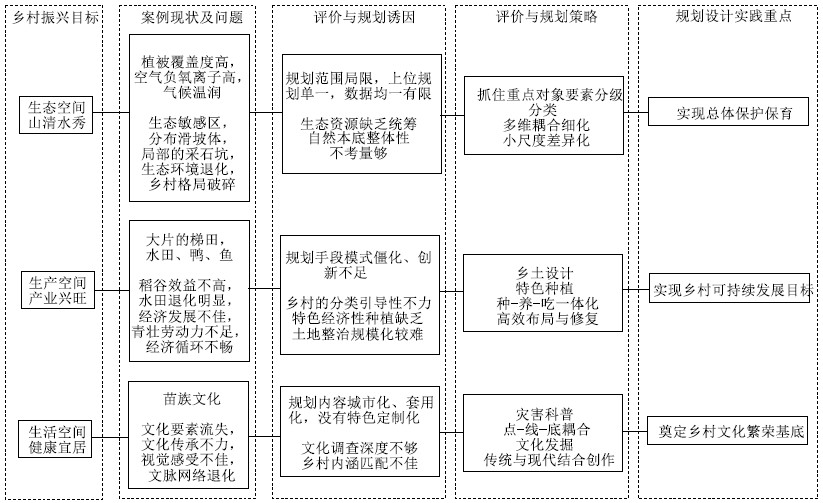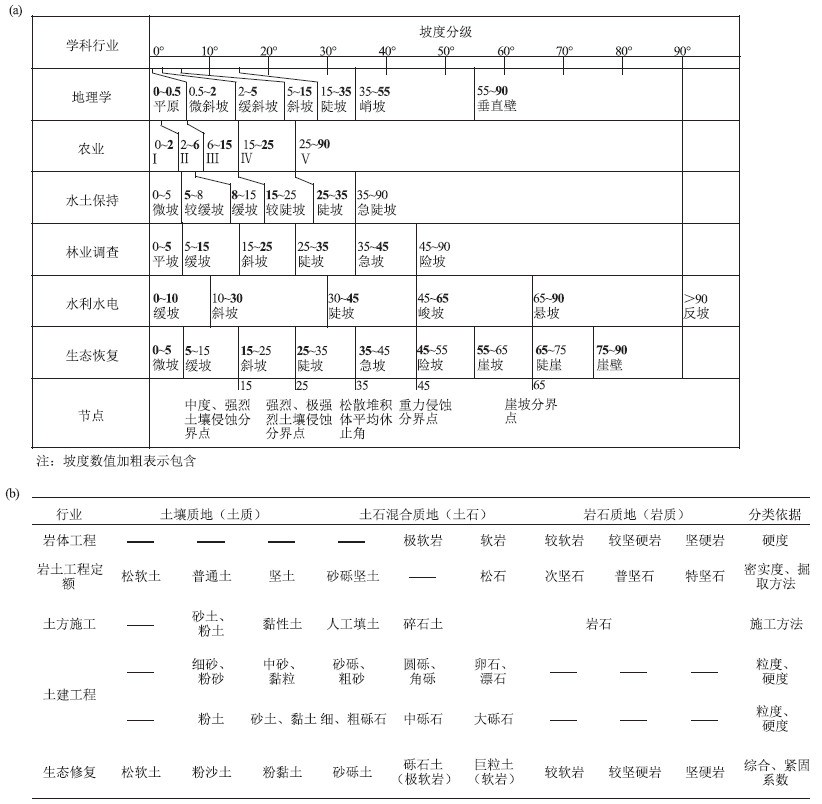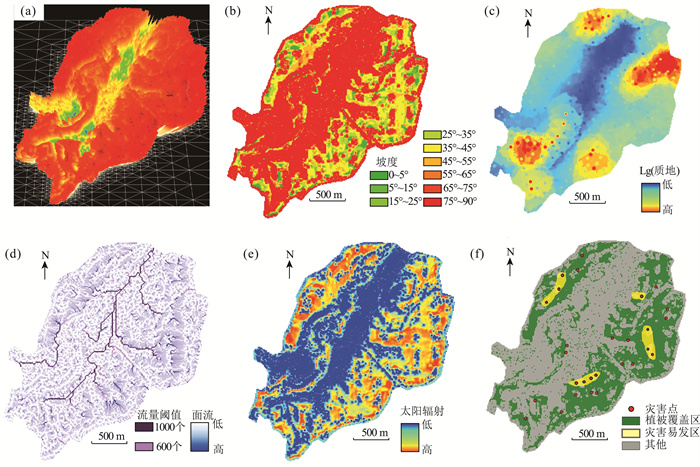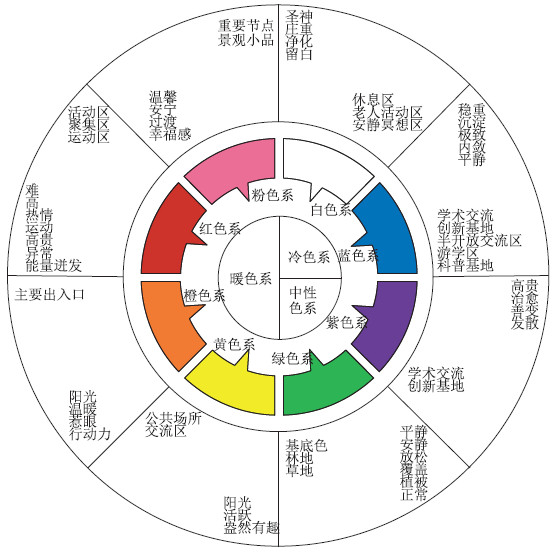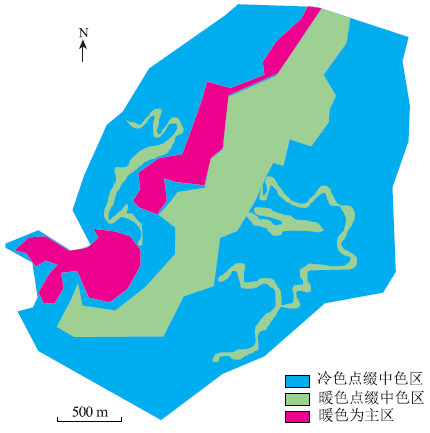Practice and exploration of rural ecological space planning
-
摘要:
生态敏感区、脆弱区、贫困区、地质灾害频发区往往呈现区域空间叠加分布的特点。以贵州某乡村生态修复规划为例,在构建对象要素的定量化、差异化评价标准体系基础上,开展乡村空间本底评价,全面发掘人文、工矿遗存、地质灾害等资源属性,结合当地特色植入生态产业,通过植物种植匹配环境色彩满足人们对美丽乡村的感官需求。基于自然恢复过程规律,以最经济的方式修复区域生态系统功能,推进美丽乡村建设,满足当地脱贫致富的愿景。所开展的"重自然、聚人文、兴产业、少干预"的可持续、近自然的生态规划设计解析,对中国乡村走出一条生态路、旅游路、产业路、经济路具有借鉴意义,同时,为新时期地质调查工作转型提供新的思路。
Abstract:Ecological sensitive areas, fragile areas, poor areas, geological disaster frequent areas are often superimposed in the regional space.A rural ecological restoration plan in Guizhou Province was taken as a case, on the basis of constructing the standard system of quantitative and differentiated evaluation of object elements, to fully evaluate background of natural ecological space.It is to comprehensively excavate the resources attributes such as humanities, industrial and mining relics, geological disasters and so on, implant the ecological industry in combination with the local characteristics, match the environmental color through plant planting, and satisfy the people's sense demand to the beautiful countryside.Based on the study on natural recovery law process, it aims to restore the function of regional ecosystem in minimum cost way, to promote the construction of beautiful villages, and to meet the local vision of getting rid of poverty.The sustainable and near-natural ecological planning analysis of "emphasizing nature, gathering humanity, developing industry and less intervention" is of great significance for our countryside to walk on an ecological road, a tourist road, an industrial road and an economic road.Meanwhile, it provides a new idea for the transformation of geological survey work in the new period.
-
Keywords:
- spatial planning /
- rural /
- evaluation /
- near-natural
-
致谢: 感谢中国地质科学院地球物理地球化学勘查研究所周国华研究员对本文细致的审阅与修改;感谢北京林业大学孙保平教授, 东方园林环境股份有限公司赵平高级工程师、王永功高级工程师、罗国占高级工程师、李枫、虢丽霞、徐峥、韩雪等在文章写作、绘图等方面提供的帮助。
-
图 2 分类型乡村的结构形态与复合维度
(据参考文献[10]修改)
Figure 2. Structural form and complex dimension of classified rural
-
张京祥, 张尚武, 段德罡, 等. 多规合一的实用性村庄规划[J]. 城市规划, 2020, 44(3): 74-83. https://www.cnki.com.cn/Article/CJFDTOTAL-CSGH202003012.htm 戴世续, 周骏, 洪双勇, 等. 新时期浙江乡村振兴规划编制思路探索——以浙江临安区高虹龙门农村综合改革规划为例[J]. 建筑与文化, 2020, 198(9): 103-105. https://www.cnki.com.cn/Article/CJFDTOTAL-JZYW202009031.htm 尹向东, 邓木林, 刘国威. 面向国土空间规划的现状调查体系思考[J/OL]. 规划师, 2021, (2): 41-44, 49[2021-04-11]. http://kns.cnki.net/kcms/detail/45.1210.tu.20210329.1631.038.html. 苏涵, 陈皓. "多规合一"的本质及其编制要点探析[J]. 规划师, 2015, 31(2): 57-62. https://www.cnki.com.cn/Article/CJFDTOTAL-GHSI201502012.htm 侯淑珺, 赵梅红. 国土空间规划背景下的村庄规划探析[J]. 农村实用技术, 2020, (7): 147-148. https://www.cnki.com.cn/Article/CJFDTOTAL-NCSJ202007074.htm 白中科. 亟待建立山水林田湖草生态保护修复试验示范科学范式[J]. 土地科学动态, 2019, (5): 5-8. 郑洋, 郝润梅, 米园, 等. 西部地区村级规划体系构建研究[J/OL]. 中国国土资源经济, 2020: 1-9[2020-11-03]. https://doi.org/10.19676/j.cnki.1672-6995.000496. 王向荣, 林箐. 自然的含义[J]. 城市环境设计, 2013, (5): 130/133: 128-129. https://www.cnki.com.cn/Article/CJFDTOTAL-CSHJ201305024.htm 李智, 张小林, 陈媛, 等. 基于城乡相互作用的中国乡村复兴研究[J]. 经济地理, 2017, 37(6): 144-150. https://www.cnki.com.cn/Article/CJFDTOTAL-JJDL201706020.htm 范凌云, 徐昕, 刘雅洁. 乡村振兴背景下苏南乡村生态营建规划策略[J]. 规划师, 2019, 35(11): 24-31. https://www.cnki.com.cn/Article/CJFDTOTAL-GHSI201911004.htm 刘志超. 新型空间规划体系下的县级"三生空间"布局与"三线"划定[J]. 规划师, 2019, 35(5): 27-31. https://www.cnki.com.cn/Article/CJFDTOTAL-GHSI201905004.htm 于贵瑞, 何洪林, 周玉科. 大数据背景下的生态系统观测与研究[J]. 中国科学院院刊, 2018, 33(8): 832-837. https://www.cnki.com.cn/Article/CJFDTOTAL-KYYX201808013.htm 吴次芳, 叶艳妹, 吴宇哲, 等. 国土空间规划[M]. 北京: 地质出版社, 2019. 何冬华, 姚江春, 袁媛. 广州生态空间用途管制方法探讨[J]. 规划师, 2019, 35(5): 32-37. https://www.cnki.com.cn/Article/CJFDTOTAL-GHSI201905005.htm 周劲. 三线·三生·三控: 城乡布局结构的宏观管控机制[J]. 规划师, 2019, 35(5): 5-12. https://www.cnki.com.cn/Article/CJFDTOTAL-GHSI201905001.htm 曾鹏, 朱柳慧, 蔡良娃. 基于三生空间网络的京津冀地区镇域乡村振兴路径[J]. 规划师, 2019, 35(15): 60-66. https://www.cnki.com.cn/Article/CJFDTOTAL-GHSI201915010.htm 陈坤秋, 龙花楼. 土地整治与乡村发展转型: 互馈机理与区域调控[J]. 中国土地科学, 2020, 34(6): 1-9. https://www.cnki.com.cn/Article/CJFDTOTAL-ZTKX202006001.htm 刘玲, 赵廷宁, 赵平, 等. 生产建设损毁土地生态修复规划设计坡度分级研究[J]. 矿山测量, 2017, 45(2): 103-107. https://www.cnki.com.cn/Article/CJFDTOTAL-KSCL201702027.htm GB/T 15772-2008. 水土保持综合治理规划通则[S]. 北京: 中国标准出版社, 2009. GB/T 26424-2010. 森林资源规划设计调查技术规程[S]. 北京: 中国标准出版社, 2011. GB 50487-2008. 水利水电工程地质勘察规范[S]. 北京: 中国计划出版社, 2009. GB/T 38360-2019. 裸露坡面植被恢复技术规范[S]. 北京: 中国质检出版社, 2020. GB 50218-2014. 工程岩体分级标准[S]. 北京: 中国计划出版社, 2015. GB 50500-2013. 建设工程工程量清单计价规范[S]. 北京: 中国计划出版社, 2013. GB 50007-2011, 建筑地基基础设计规范[S]. 北京: 中国建筑工业出版社, 2012. GB/T 50145-2007. 土的工程分类标准[S]. 北京: 中国计划出版社, 2008. ASTM D 2487-2006. Standard Practice for Classification of Soils for Engineering Purposes (Unified Soil Classification System)[S]. International ASTM, 2008.
崔庆伟. 风景园林学视角下的中国采石干扰土地修复治理现况反思[J]. 中国园林, 2017, 33(5): 18-23. https://www.cnki.com.cn/Article/CJFDTOTAL-ZGYL201705005.htm 农业农村部. 全国乡村产业发展规划(2020-2025年)[Z]. 2020-07-09// http://www.gov.cn/zhengce/zhengceku/2020-07/17/content_5527720.htm. Yu K J, Work with and by nature: the essence of territorial spatial planning and ecological restoration[J]. Landscabe Architecture Frontiers, 2020, 8(1): 4-9. http://www.researchgate.net/publication/340382096_WORK_WITH_AND_BY_NATURE_THE_ESSENCE_OF_TERRITORIAL_SPATIAL_PLANNING_AND_ECOLOGICAL_RESTORATION
周永章, 刘楠, 陈川, 等. 开启区块链地质应用新时代[J]. 地质通报, 2020, 39(1): 1-6. http://dzhtb.cgs.cn/gbc/ch/reader/view_abstract.aspx?file_no=20200101&flag=1 Cheng Q, Zhao M. A New International Initiative for Facilitating Data-Driven Earth Science Transformation[J]. Geological Society London Special Publications, 2020, 499(1): SP499-2019-158. http://www.researchgate.net/publication/341039246_A_New_International_Initiative_for_Facilitating_Data-Driven_Earth_Science_Transformation



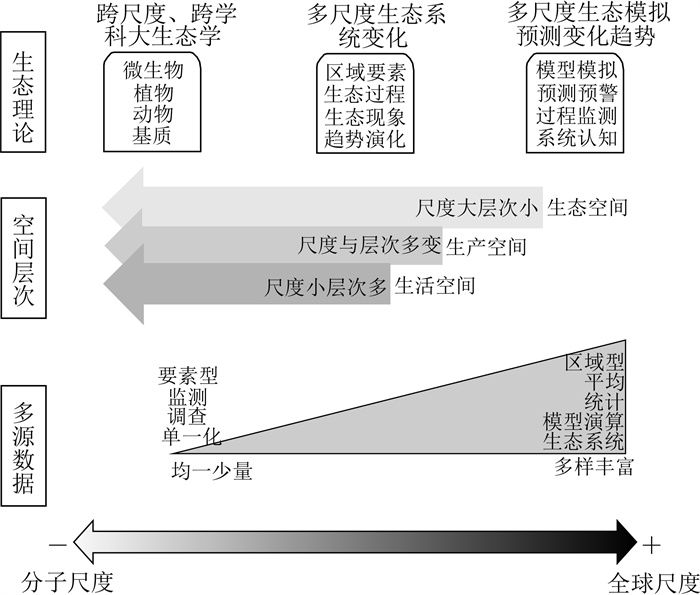
 下载:
下载:

